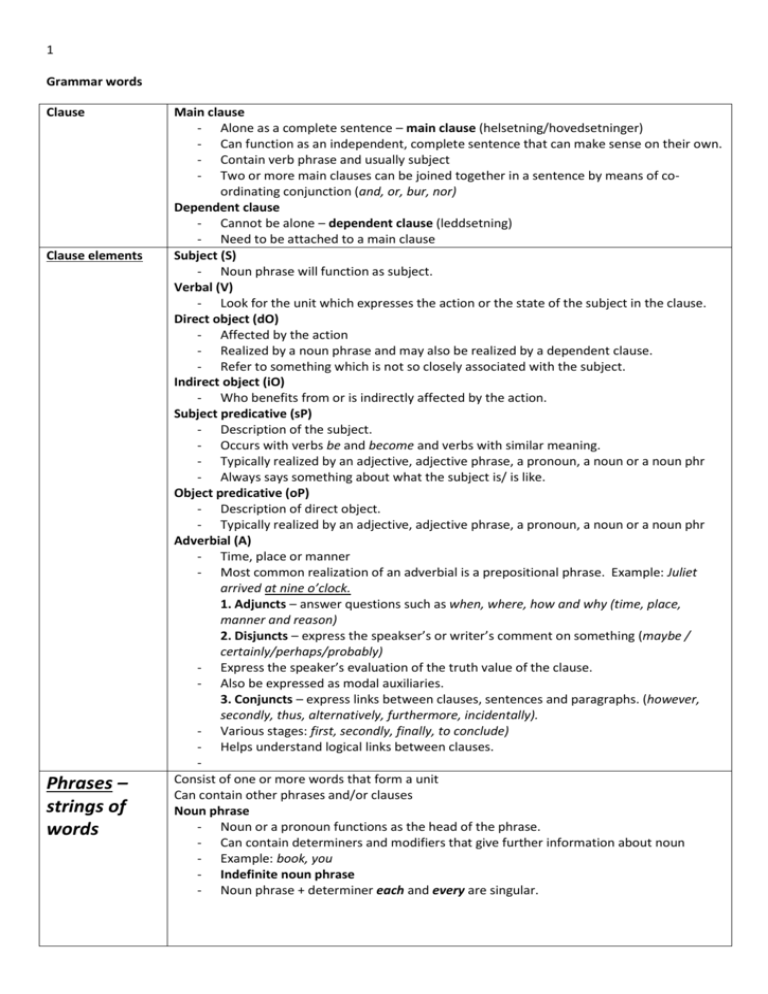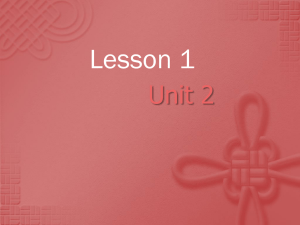Lexical words
advertisement

1 Grammar words Clause Clause elements Phrases – strings of words Main clause - Alone as a complete sentence – main clause (helsetning/hovedsetninger) - Can function as an independent, complete sentence that can make sense on their own. - Contain verb phrase and usually subject - Two or more main clauses can be joined together in a sentence by means of coordinating conjunction (and, or, bur, nor) Dependent clause - Cannot be alone – dependent clause (leddsetning) - Need to be attached to a main clause Subject (S) - Noun phrase will function as subject. Verbal (V) - Look for the unit which expresses the action or the state of the subject in the clause. Direct object (dO) - Affected by the action - Realized by a noun phrase and may also be realized by a dependent clause. - Refer to something which is not so closely associated with the subject. Indirect object (iO) - Who benefits from or is indirectly affected by the action. Subject predicative (sP) - Description of the subject. - Occurs with verbs be and become and verbs with similar meaning. - Typically realized by an adjective, adjective phrase, a pronoun, a noun or a noun phr - Always says something about what the subject is/ is like. Object predicative (oP) - Description of direct object. - Typically realized by an adjective, adjective phrase, a pronoun, a noun or a noun phr Adverbial (A) - Time, place or manner - Most common realization of an adverbial is a prepositional phrase. Example: Juliet arrived at nine o’clock. 1. Adjuncts – answer questions such as when, where, how and why (time, place, manner and reason) 2. Disjuncts – express the speakser’s or writer’s comment on something (maybe / certainly/perhaps/probably) - Express the speaker’s evaluation of the truth value of the clause. - Also be expressed as modal auxiliaries. 3. Conjuncts – express links between clauses, sentences and paragraphs. (however, secondly, thus, alternatively, furthermore, incidentally). - Various stages: first, secondly, finally, to conclude) - Helps understand logical links between clauses. Consist of one or more words that form a unit Can contain other phrases and/or clauses Noun phrase - Noun or a pronoun functions as the head of the phrase. - Can contain determiners and modifiers that give further information about noun - Example: book, you - Indefinite noun phrase - Noun phrase + determiner each and every are singular. 2 Verb phrase - Contains verb and may be preceded by one or more auxiliaries - Refers to an action carried out by the subject - Example: eat, eaten, eating, - Can be finite (are marked for tense). Obligatory elements are (lexical verb and tense or modality) - Can be non-finite (infinitive, the –ing form (present participle) and past participle. Adjective phrase - Adjective function as the head of the phrase - May be accompanied by one or more modifiers - Example: happy, interesting Lexical words Content words – most central words for the meaning of sentences. Need to work with function word. Nouns Adverb phrase - Adverb function as the head of the phrase - Can contain modifiers - Example: carefully Preposition phrase - Consist of preposition plus a complement, usually a noun/noun phrase - Both elements are equally important and obligatory. - Example: in, at, on, by Noun - Naming words for a thing, an idea, a person - Common nouns (things, ideas) - Proper nouns (people, places, institutions) - Example: grandmother, house, iron, happiness, grammar, Tim and York Verb - describes an action or activity - s in 3rd person singular, present tense - ed is added in the past tense - Example: be, have, go, walk, laugh and jump - Linked verbs be and become Adjective - descriptive words – quality and characteristic of persons or things - compared with –er, and –est, more/most - occur with nouns - endings are: -y, -ic, -ish, and –ous - Example: old, happy, interesting, wonderful, yellow, blue Adverb - 1. Descriptive word (describe verbs, adjectives or other adverbs) (happily, well, very) - 2. Serve as connecting words (however) - 3. Refer to time, place, manner, degree (already/here) - 4. Refer to viewpoint, truth or certainty (fortunately, surely and maybe) - Compared with –er, and –est or more/most - Some adverbs has ending – ly Common nouns (woman, car, ice cream, music) - fellesnavn - Written with lower case letters. Countable nouns – shirt(s), pen(s), coin(s), car(s), book(s) - Can be found in both singular and plural form. - Some determiners can be used with countable nouns (a, an, these/those, many, more, few, fewer) Uncountable nouns – music, homework, snow, bread, coffee, money, furniture, water, news - Refer to “mass of” - Referred to as “it”, never as “they” - Determiners used with uncountable nouns (much, little, less) 3 Proper nouns (Clara, Manchester, Saturday, Christmas, Newsweek) - egennavn - Names of somebody or something. - Person, place, time, holiday, days of the weeks, monthes - Has initial capital letter – occur without determiners and modifiers, don’t allow plural form. Compound nouns (sammensatte substantive) - Composed of at least two parts (toothbrush) - Says something about what type of thing the noun refers to. (compact disk, red wine, wild animals, public transports, criminal court) - Noun and another word (bestseller) (stand-in) - 1. Separate words (grammar course, post office) - 2. With a hyphen between the words (dry-cleaner’s, runner-up). Most commonly in compounds containing words that are not nouns. - 3. As one word (newspaper, toothbrush) Singular and plural nouns - Ends in –Y. – regular nouns = Ends in –(e)s, - ies (sky-skies) - Ends in –F in singular = adds V and –es = (leaf=leaves) - Ends –S is placed at the end. - Irregular and regular nouns - Same endings (sheep, deer, series, headquarters, aircraft, steelworks, barracks, crossroads) – used in plural without extra –s - Some nouns are only in plural: scissors, tongs, glasses, binoculars, stairs, steps, wages, congratulations, thanks, manners, outskirts, surroundings. Some nouns have plural form, but have singular meaning and grammar. Physics Linguistics Politics Measles Mumps Billiards darts Verbs Collective nouns - Refer to a group of people - Family, team, crew, staff, committee. - Can behave either as singular or plural nouns, depending on the meaning or use of the nouns. - Pronouns they and them are natural choice. But pronoun it can also be used. - In American English they are likely to behave as singular with regard to the form of the verb. The Genitive - Express possession, refer to period of time, measure or a type - S’Genitiv - refers to the owner, and the following noun to the thing being own. (determiner) - Mother’s, parents’, hour’s, pound’s, women’s, Sweden’s, - Consist of determiner plus a head noun - Of-construction consists of a head noun plus a post modifier (the of-phrase) - Singular nouns the genitive is formed by adding –s (The girl’s car) - Plural nouns that end in –s, we add the apostrophe (‘) (The girls’ car) Lexical verbs - Refer to action, activities, states or relations - Only syntactic function is head of a verb phrase Compound verbs - Example: Play down – influence each other. (Verb + particle (adverb/ preposition) Auxiliaries - Have no s-form (I must leave – he must leave) - Have little or no meaning of their own 4 Tense Present tense Past tense - The verb be in the present tense (am, are, is) Also used about habits (The sun sets in the West) - Can be used make an utterance less direct, and hens more polite. Was, were Future- referring expression Will – future Present progressive The future progressive - Be going to - Be to The simple present tense - - Future in the past - Verb phrase express additional meanings having to do with degree of certainty and planning. (I am, we will) Will/shell/ ‘ll Most frequently used expression. Shell – mostly used in questions. Am/ is/ are Refer to future actions that are planned. Take place in the relatively near future. When we want to talk about future actions and activities without alluding (hentyde) to present plans and intentions. Example: Tomorrow morning I’ll be flying to London Can be used to ask indirect, polite questions about peoples plans. Used about future actions which the subject intends to carry out. Indicate that something is likely to happen. Example: John said she was going to buy a new dress for the party. Used about future actions and events which have been planned or determined by some other person than those involved in it. Example: We are to leave for England on the twenty-third. Used about future events or actions that are fixed and practically guaranteed to take place, typically about schedules. Example: Exam start on the tenth. We leave for England on the twenty-third Usually understood as future-referring only if there is an appropriate time adverbial in the same clause. Used a lot more frequently to refer to the future in Norwegian than in English. Contain a form of the auxiliary be – be going to, be to and the progressive – can also be in the past tense. Something happening after a point of reference in the past. Example: They were going to get married two months later. They would get married two months laer. 5 Adjective - Function as modifiers of noun and as predicative - Refer to features, qualities and characterizations - Modify nouns and pronouns - Description of people and things - Mark degrees Comparative – More (more elegant) Superlative - Most (most elegant) - Fun, real, right, wrong (one syllable) Endings –er, -est (bigger, biggest) One syllable Two syllables Three or more syllables Irregular base form Bad Many/much Little Old Far Adverbs Base form small real Obscure Careful Happy Gentle Dangerous Interesting Comperative form Worse More Less Older Further Comperative Smaller More real More obsecure More careful More happy More gengle More dangerous More interesting Superlative Smallest Most real Most obsecure Most careful Happiest Gentliest Most dangerous Most interesting Superlative form Worst Most Least Oldest (elder-eldest) Furthest (farther-farthest) Classifying adjectives - Adjective + noun = compound noun (says something about what type of thing the noun refers to. (compact disk, public transport, wild animals) Emphasizing adjectives - Point out references of noun, or give special emphasis to the head noun. - Example: I’m looking for a book by a certain Mr. Shakespeare. I was pure luck that she got in. Nominalized adjectives - Head of a noun phrase – used with a)group of people b) abstract ideas - They which refer to people (the rich, the homeless, the dead, the young, the elderly) – have a plural meaning. - They which refer to an abstract entity combine with singular verbals. Nationally adjectives - Norwegian American, British, English - Function as adverbials and as modifiers of adjectives and adverbs. - Modify the rest of the clause or the sentence. - Many adverbs are formed by adding –ly to the adjective. - -y ending of an adjective becomes –I in front of –ly - Example: strong – strongly, full – fully, happy – happily, easy – easily Manner adverbs - Ly – ending (describe how something is done) Other adverbs (refer in time, place and reason) - Soon, still, always, just, now, then, already, sometimes, yesterday, later, not, never, here, there, abroad, even, however, therefore 6 Sometimes adjective and adverb can used in the same position, with different meaning Adjective Adverbs The old man turned slow The old man turned slowly We found it (very) easy We found it (very) easily There was a pleasant, informal atmosphere There was a pleasantly informal atmosphere. Function word More of a supporting role Pronouns Auxiliaries (Verbs) Determiners Sentences Pronouns - Used instead of a noun - He, she, yourself, they, anybody, that, who - Functions as the head of the noun phrase. - Same form as determiners. (some and any) Determiners - In front of a noun or noun phrase - Identify the noun - Followed by a noun - Same form as pronouns (some and any) - A, the (definiteness), my/your/ our (ownership), all, some, one, two, this/that (distance) Prepositions - Relationship in time and space - At, in, of, on, outside, with Conjunctions - Coordinating –link together words, phrases or clauses (And, but, or, nor) - Subordinating – link a dependent clause to another clause (when, because, since, that) Auxiliaries (Verbs) - In front of lexical verbs. Express tense, aspect (have, be, may, can, would) - Have little or no meaning of their own The infinitive marker to (infinitive marker) - occur with infinitive form of a verb (to read, to sleep) Existential there - Something exists and is typically used to introduce new information. - Used instead of noun (she, yours). Functions as head of noun. - It and there Grammatical auxiliaries (be, do, have) - They can also function as lexical verbs - Be, do and have no meaning of their own. Part of grammatical construction. Modal auxiliaries (can, could, may, might, must, ought to, shall, should, will, would) Ch12 - They are finite form. THE - Definite article (definiteness, numbers, ownership and distance) Complete sentences. - Contains a main clause. Simple sentences - Consists of one main clause. - Has only one set of subject and verbal - Example: I lost my grammar book yesterday. Compound sentences - Least two main clauses, each containing a verbal, usually with an accompanying subject. - Example: I lost my grammar book, but I will try to manage anyway. 7 Complex sentences - One “main” set of subject and verbal (a main clause) and a dependent clause (with its own set of subject and verbal) - Example: I am very upset because my grammar book has been stolen. (underlined – dependent clause) Examples NOUNS - Uncountable vs. Countable nouns Uncountable meaning Countable meaning She sat down with pen and paper She wrote three papers in one week The decorations are made of paper. I found the paper on the mat George pays a lot of interest on his mortgage. George has a wide range of interests. The children love chicken. (meat) Their children love chickens. (animals) Is there life on other planets? The action saved many lives. Remember to buy tea and coffee. The shop has a range of teas and coffes. Irregular and regular nouns (singular and plural) Singular nouns – regular Plural nouns - regular Sky Skies Penny Pennies Singular nouns – irregular Plural nouns – irregular Man Men Woman Women Child Children Sheep Sheep Leaf Leaves Crisis Crises Analysis Analyses Criterion Criteria (criterions) Formula Formulae Phenomenon Phenomena (phenomenons) Leaf Leaves People People Police Police Cattle Cattle 8 PRONOUNS Personal Demonstrative – clear reference. Possessive Indefinite pronouns Third person singular. - When used by subject – followed by s-form of the verb Interrogative Relative- similar to subordinating conjunctions. Reciprocal Reflexive – ending in self or –selves In Norwegian (seg/selv) Types of pronouns I/me, you, he/him, she/her, it, we/us, you, they/them This, that, these, those Mine, yours, his, hers, ours, yours, theirs One, some, any, others, none, somebody, something, someone, anybody, anything, nothing Have you read this? Have you read this? The job is hers. There is nothing here for you. What, who, whom, which What did you say? Who is that woman I saw you with? Who, whom – refers to people Which –things and phenomena That – people or things Each other, one another Myself, yourself, himself, herself, itself, ourselves, yourselves, themselves This is the house that Jack built. This is Jack, who built the house. They kissed each other. Maty was disappointed with herself. IT and THERE (PRONOUN) The most common mistake is to use it where there is required. It - It is her favorite poem – (referential pronoun) Referential pronoun (henvisning) Example: You must hurry if you want to catch - Refer to a thing of a fact that has been mentioned the train. It leaves in ten minutes. earlier in the text. - It is hot in here – (empty it) – Example: It is - Same way as we use he and she to human beings. raining. Empty it - It is poetry she likes to read (it-cleft) – - No doer for the action Example: John broke the window It was - Use it as subject about temperature, time and John who broke the window. distance. - It is a pity that you have to leave so early - Does not refer to anything (anticipatory it) Example: It is good to see It in cleft sentences you (compare: to see you is good). They found - Special emphasis to one of the elements it difficult to believe that he had never done it - Reorganize sentence into it-cleft before. - Use second sentence It as anticipatory subject (aS) - When subject is moved out of normal subject position, it is used as a “place holder” in front of the verbal – this place holder is called “anticipatory it” - Can function as anticipatory object. - There - Can be used as an adverb referring to place - Example: There I met the King. - Can be used as an anticipatory subject in sentences about existence. - Former type of there is called locative. Existential there - Always unstressed. 9 DETERMINERS Articles (definite, indefinite and zero) Demonstrative determiners and pronouns indicate how far away something is in space, time and reality Possessive determiners. Used to indicate ownership. Also used with clothes and body parts. Quantifying determiners Some - pronouns involving some and any – something, somewhere - Used in declarative (fortellende) and positive (bekreftende)sentences Any - pronouns involving some and any – anyone, anybody - Used in negative (nektende) and interrogative (spørrende) sentences S-Genitive Wh-determiners Types of determiner A, an, the From this side of the house the lake seemed very near. From this side of the house the lake seemed very near. This, these (closeness) that, those (distance) My, our, your, his, her, its, their Some, any, - - all, every, each, no, enough, either, neither, another, many, few, a lot of, …two, sex hundred neither and nor behave like either and or Tom’s, Mary’s, the woman’s What, which, whose, whatever, whichever She opened her bag. Paul broke the arm He kept his hands in the pockets of his coat. - There were no curtains. - I would like some tea - Somebody is waiting for you - Is there any tea left? - I don’t need any milk in it. - Could you give me any examples? - Could you lend me any money? - Is there anything I should know? Paul’s shirt was torn. Whose money did she steal? Whichever way you look there was nothing but water. ARTICLES Indefinite article – usually used in noun phrase that represents new information: when something is introduced for the first time in the text. Constantly used with singular, countable noun. Definite article – reader/listener can identify what the head noun refers to. The noun may be known or identifiable. Used in English with names of musical instruments and with names of certain public services. Zero article - much the same meaning as indefinite article when it is used with plural on uncountable nouns. It is used with abstract uncountable noun with general reference, such as. English use zero articles with nouns to referring to institutions. Form a / an The - Examples A sparrow, an owl, a theory, a writer, a politician, a Norwegian, a fool, a big nose, a taxi The sparrow, the owl, the theory, the guitar, the phone, the Internet, the BBC Sparrows, life, Jack, Earth, carrots, sugar, love, death, nature, society 10 Definite article Definite article + countable noun in singular = general kind of references. Nationality words that refer to groups of people usually take the definite article. General meaning. Mountain ranges Rivers Countries Groups of Islands - The Tiger is a dangerous animal. (all tiders, not a particular one) We are studying the noun phrase. (noun phrase in general) - Again, the Japanese have been at the front (Japanes people in general) - Medicaid services are for the poor and needy. (everybody who is poor and needy) The alps, the Rocky Mountains, the Pennines The Thames, the Missoury The Netherland, the United States, the United Kingdom The Philippines, the Orkneys, the Canary Islands GRAMMAR VOCABULARY Abbreviations Attributive Base form Bloated words Compound nouns Contrastive points Compared Clause Case letter Compound Complex Complex-transitive verbs Di-transitive verbs Intransitive verbs Initial capital letter Linking verbs Modifiers Nominalize Notional concord Syntactic functions Syntactic function Subject Sentence Substitution Structure Verbal Forkortelser premodifying Infinitive form Phrases that have a lexical word as their head Sammensatte substantive (toothbrush) Plural form leaves corresponding to the singular leaf. Uncountable in English, and countable in Norwegian. Gradbøyd Grammatical unit. It must contain at least a verbal, with subject. Første bokstav. Sammensatt Kompleks Requires a direct object and an object predicative When a verb requires two objects (direct and indirect) Does not take a direct object. – run Storbokstav I egennavn. Uselvstendige verb that give further information about noun can be found before (premodifiers) and after (postmodifiers) the noun Turn into a noun Verbal agrees with the meaning rather than the form of the subject Verbal and subject Direct object Thing or a person that is responsible for the action. It is also noun phrase that determines which form the verbs should have (have/has) Has a capital letter at the beginning and a full stop, question mark or exclamation mark (utropstegn) at the end We try to replace a unit with one single word The little girl (she) was kissing (kissed) the poor boy living next door (him). Words – phrases – clauses – sentences – text Syntactic function of the verb phrase 11








